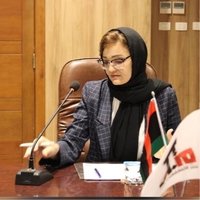
A blog of the Middle East Women's Initiative
Expanding women’s rights and representation in the public sector is a critical component for the success of democracy in Libya and across the Arab world.
Women often become the emblem of revolutions, as we are currently witnessing with the street protests in Iran and was evident by women’s active role during the Arab uprisings of 2011-12 and 2019. In Libya, women were leading participants in protests that brought down the Gaddafi regime that eventually led to a political transition. They participated in sit-ins and demonstrations, and even cooked food for other revolutionaries. This came half a century after Libyan women took part in demonstrations demanding the right to vote.
Women make up an estimated 55 percent of Libya’s 2.7 million registered voters. In 2014, 450 women campaigned for the 200 available party and individual seats, and their chances in the party lists grew more favorable. For women, entering the political scene is a courageous gesture that enhances their rights and distances them from the restrictions of regionalism in Libya.
Women in politics in Libya
Many Libyans believe in the importance of women’s representation in the Transitional National Council, which provides an effective model for political, economic, and social participation. This system contrasts drastically with the Gaddafi regime, which abused rights and protected only the security establishment. The United Nations, the United States, and Turkey supported Libyan women’s efforts to achieve a democratic system, especially in West Libya, and to open the political space, rejoicing in the democracy that was supported by NATO and some Arab countries. This is a message to the world about the importance of democracy and empowerment of Arab women, and that Islam honors rather than humiliates them.
Expanding women’s rights and representation in the public sector is a critical component for the success of democracy in Libya and across the Arab world. Legislative and constitutional action that guarantees an equal right to participate in building up the civil state is imperative. Gender quotas ensure 16 percent of seats in the Majlis Al-Nuwaab (House of Representatives) are held by women.
Although, in 2016, the situation changed for the East Side of Libya when the United States opened the space for Khalifa Haftar’s military regime in Benghazi, which disrupts the electoral processes in the east and south of Libya, leading to greater control the over political parties. The Haftar regime does not support the political empowerment of women, or effort to achieve justice and equality. Women retained the right to participate in politics largely thanks to the intervention of the UN mission.
Expanding women’s representation
Activities in Tripoli indicate there are efforts to organize women’s blocs and build solidarity to demand elections and increase women’s participation in the electoral process. Efforts are also underway to support women who have the capabilities to impose their rights, especially through the next parliament. A woman activist told me the presence of women in leadership positions are supported by leaders of the February 2011 revolution—leaders who believe in and fight for a democratic system in central and western cities of Libya. As in the upcoming presidential elections, this will help the stability of the country and the success of the democratic process in Libya.
Women need the backing of the international community to maintain their right to participate in politics and protect them against any violence waged by parties that reject the democratic system. They also need to increase international support for those who participated in supporting the revolution. Further, ensuring transparent elections is crucial and requires the participation of security leaders in Tripoli. Women in Libya’s western provinces refuse to return to military rule and will defend their husbands who were martyred in the revolution and the wounded and victims of the war in 2011.
Author


Middle East Program
The Wilson Center’s Middle East Program serves as a crucial resource for the policymaking community and beyond, providing analyses and research that helps inform US foreign policymaking, stimulates public debate, and expands knowledge about issues in the wider Middle East and North Africa (MENA) region. Read more


Middle East Women's Initiative
The Middle East Women's Initiative (MEWI) promotes the empowerment of women in the region through an open and inclusive dialogue with women leaders from the Middle East and continuous research. Read more

Explore More in Enheduanna
Browse Enheduanna
Women are the Catalysts for Change in Lebanon

How Education Can Empower Young Women in MENA


